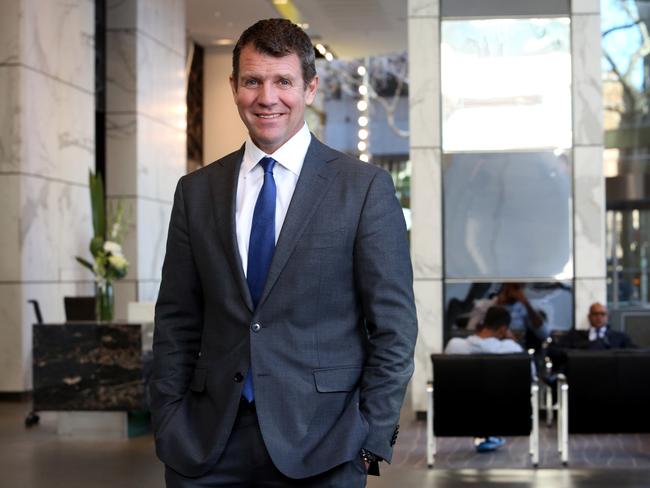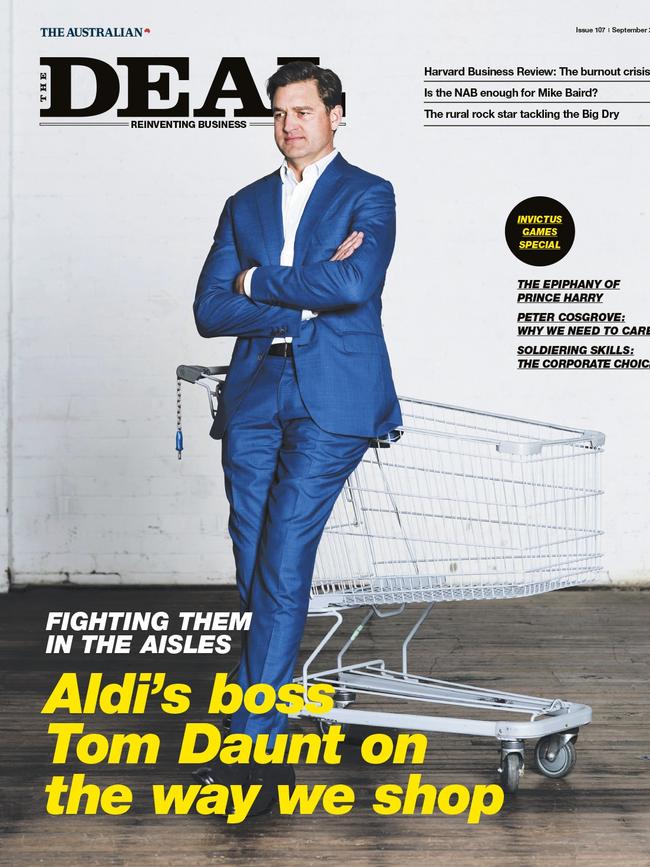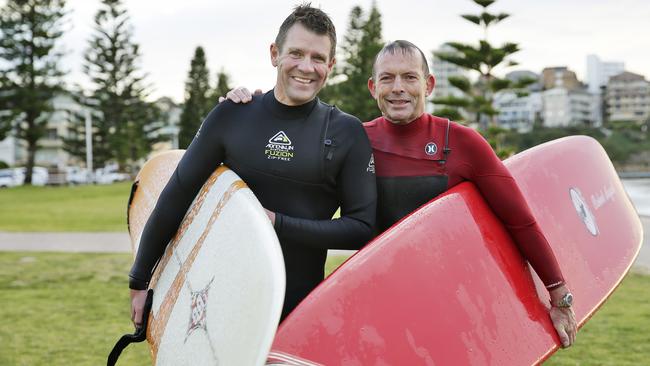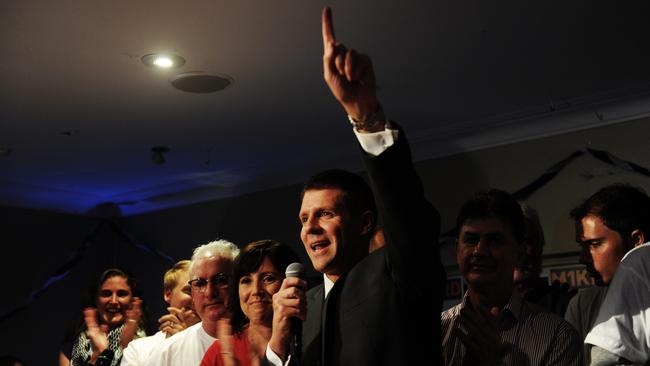Former NSW premier Mike Baird happy in NAB banking role
Mike Baird is looking relaxed. And why not? At 50, he earns $2m a year at NAB and his pressure-cooker days as NSW’s 44th premier are behind him.

Mike Baird is looking very relaxed. And why not? At 50, he earns $2 million a year at the National Australia Bank and his pressure-cooker days as NSW’s 44th premier are behind him.
Those were the days of hard slog selling to voters the idea of flogging the State’s electricity resources; or copping a shellacking for banning greyhound racing; or cleaning up after ICAC scandals.
Within three months last year, Baird went from being the boss of NSW to one of eight executives reporting to the NAB’s chief executive, Andrew Thorburn. But the transition that began in January 2017, when he suddenly announced his departure after a decade in politics, took a little longer.
“I probably took 12 months to recover [from my time as premier],” he says. “You know it’s having an impact on you mentally and emotionally and physically in many respects, and not just you personally but obviously, more broadly, the family.
“The true extent of that is not really understood until you stop, and that was something that surprised me. But having been through that now it’s obviously good to be on the other side.”
Baird could not have foreseen when he joined the NAB that he would be immersed, like every other Australian banker, in the searing royal commission into the sector. But as the bank’s chief customer officer, corporate and institutional banking, he sees an upside. Indeed he insists the dramas are an “opportunity” to be embraced. Cleaning up the banks while still making a profit remains a realistic goal for the former premier, whose idealistic yet pragmatic approach appealed to voters during his 10 years in politics.
“A crisis provides an opportunity to reset and those who make the most of those times are the ones who thrive in the long term,” Baird says. “I think if you follow the royal commission from beginning to end there’s been a number of things that no-one can be proud of, and it’s probably as a collective; people having too much focus on and prioritisation of shareholders versus customer and community, and that balance has to shift.”

He says he is happy in his new life, but he does not emphatically rule out either wanting to be CEO of the bank or a return to politics in the federal sphere. Is that in part because it’s hard to move from running a state to being one of several bosses at the bank?
Baird laughs: “I’ve actually enjoyed that. I think there are moments like results day where the CEO does all the media and you watch the CEO front the investors and deal with the Q&A, and I reflect that used to be budget day or key issues the premier had to deal with, and I reflect: ‘that’s kinda nice not to have to do that’.
“[I think] ‘Good luck, Andrew [Thorburn]; you’re going to do a great job’ – and he does. There’s an adjustment in that but it’s not something I crave or desire.”
Those close to Baird believe he was scarred by his experience as premier. He went from stellar poll ratings to derision after an ill-judged Facebook post on Sydney’s lockout laws and a controversial ban on greyhound racing. His popularity dropped through the floor.
The banker-turned-politician-turned banker spent two years and nine months as premier, three years as treasurer and close to 10 years in parliament.
‘Having had to manage the transition, Baird sympathises with prime ministers who have lost their jobs over the past eight years.’
“When I left I didn’t know what I was going to do, and I was really surprised and humbled [by] the number of opportunities that were presented,” he says. “But I think this role was a capacity to work with someone I immensely respected both personally and professionally.
“It was an organisation I actually started my career as a graduate [with], and it was an area [where] I’d spent 17 years of banking previously. Obviously there’s a period of adjustment from leading a state to being part of an executive team in a corporate context, but I really enjoyed that challenge.”
Did he struggle with the loss of public attention?
“There are some people I thought were friends who obviously stop calling and there is a personal element to that, but in terms of a public sense – no, I really enjoyed the public scrutiny coming off. I obviously tried to be myself in the day-in day-out, [but] when you have people turning up with microphones to the house when the kids are going to school, security around your house 24 hours a day… I can imagine if [you spent] a few months doing nothing that might become really quite hard, but I didn’t really experience that. I think public scrutiny coming off was almost a sense of real relief.”
But having had to manage the transition, Baird sympathises with prime ministers who have lost their jobs over the past eight years. “I think we need to do much more to celebrate what our leaders have done,” he says. “At times we need to reflect and say ‘look at what they have done’.
“Obviously Hawke and Keating and Howard speak for themselves, but even in the recent period where so much vitriol is around … you look at Kevin Rudd, [who] delivered the apology; Julia Gillard was the first female PM – both incredible achievements that changed the shape of the nation.
“You look at what Tony Abbott did. Tony Abbott was a critical player in the delivery of three key trade arrangements across Asia. He [delivered an] incredible symbolic achievement in terms of taking government for a week to indigenous Australia.
“Malcolm Turnbull – the capacity to gauge and negotiate with a president like President Trump, the exemptions he achieved through that on the tariffs being applied across the world showed a great capacity to deliver for this country.
“I think we should be reminding ourselves at times that we have leaders who aren’t perfect, who aren’t delivering every single thing that every single person wants but ... actually celebrate when they do great things for this country. I think there should be some more time spent on that, rather than what we’ve seen.

“If you talk to anyone, they want more stability, not less. I certainly think that’s the prevailing sense across the community. But ... so much time and energy [is] spent on the shortcomings ... from one end of the political spectrum to the other.”
Baird concedes he could never have imagined that, having joined the bank, he would be faced with a royal commission into the banking sector. But he believes it’s an opportunity to improve the practices and images of our banks.
Along with Thorburn, he lobbied then treasurer Scott Morrison – and other banks – to set up the commission with the co-operation of the banks, having seen the writing on the wall with Labor and some Nationals backing the commission.
“Look, ultimately that was the decision Andrew and our chairman [Ken Henry] made, [to embrace the royal commission],” Baird says. “I obviously contributed as part of that … we collectively had a strong view that there were deep concerns in the community, we shouldn’t have anything to hide, let’s put everything on the table; where there’s an opportunity to improve, let’s do it.
“Obviously it [the royal commission] wasn’t something I anticipated, but I see it as a real opportunity.”
He was speaking before the Australian Securities & Investment Commission launched legal action against the bank, accusing it of breaking the law 77 times and undermining confidence in the superannuation system over a fee-for-no-service scandal.
The crisis is not unlike the one Baird faced when he became premier in 2014, when his predecessor, Barry O’Farrell, resigned after misleading the Independent Commission Against Corruption over the gift of a $3000 bottle of Grange. The new premier sacked several of his MPs as he took a zero tolerance approach to those named at ICAC.
He says the image of greedy banks is a “broad public view” and the sector needs to understand the importance of a social licence to operate. But he is opposed to a formal social licence, as suggested recently by the ASX Corporate Governance council. The proposal was later dumped. Baird argues that “the responsibility should sit with individual companies and individual teams … it’s something we’re taking very seriously”.
The social licence, involves, for example, an understanding that sometimes a bank needs to be flexible. Baird mentions a recent change the NAB made to assist farmers.
“One of the things we had is when you had a drought the farmer obviously lost cash flow [and was] unable to make his or her repayments. Penalty interest was applied. [You think], hang on ... if you can’t meet your current repayments you’re not going to be able to make the penalty payment. So that’s been taken away.”
‘You would be hard pressed to find a staffer who did not rave about working for him in the premier’s office.’
Baird argues that if the bank supports its customers “when they’re in need” and connects more strongly with the community, “in the longer term I think there’s a stronger shareholder”. He predicts attitudes will change: “If you roll forward 10 years, I think we’ll be very different. I actually think we’ll look back at the royal commission as a positive time where learning from our mistakes makes us stronger, but more importantly makes our customers and the communities stronger because of the actions we take.”
While in government Baird had a reputation for ruling his cabinet with an iron fist, but you would be hard pressed to find a staffer who did not rave about working for him in the premier’s office. Today he stresses the need to be collegiate as a leader.
“Having values is probably critically important,” he says. “You have to have a basis for what you as an organisation believe in. You have a critical role in unity. There have to be furious attempts to maintain unity ... you can do much more together.
“You have to have a clear vision. I don’t think enough time is spent on trying to keep teams together and personalities together. The vision is critically important; you need to know where you are going and where the organisation or group you’re leading is going.
“The last thing I think is really important is perspective. Any leader can be consumed by the events, or the role, or the day-to-day. Every leader needs to find a way to remove themselves [from the day to day] to get a genuine perspective on the importance of the issues they’re facing in their in-tray, versus family, friends, community, personal passions and life more broadly.
“There are undoubtedly more people with more challenges than you’ll ever have and getting some understanding of that, I think, has to be part of the discipline of a leader.”
Baird lists his “proudest day” at the bank as its sponsorship of the Special Olympics Australia National Games, held in Adelaide earlier this year. He says there are 600,000 people across Australia with intellectual disability. “They’ve really struggled to get financial backers and I was very passionate about it,” he says.

“I saw the opportunity and the purpose of NAB is to ... move Australia forward. It was very consistent, and I saw an opportunity for our staff to become involved. We had a few hundred NAB staff go to Adelaide and volunteer in the Special Olympic Games, and I saw for two days our team roll their sleeves up, hug [the athletes] when they were crying, and encourage them and cheer them when they were trying to excel across various different sports. That was the proudest day I had spent at the bank.”
Can he do as much good in banking as in politics?
“If you look at our purpose, ‘Back the bold who move Australia forward’, by its nature we are doing that with customers; you are making a difference,” says the former premier. “You look at Frank Lowy. When he initially came to banks he was knocked back, but his vision of Westfield ... The NAB backed him back in the 60s. Whether people like the Westfield model or not, it’s had a big impact, provided tens of thousands of jobs, grown the economy, by its nature has made a big difference.”
Baird reveals he is involved in a proposal that could “turn housing affordability on its head” but refuses to divulge details. “It’s certainly a big development we’re working on,” he says. “There’s a structured proposal I think is incredibly exciting that could make a real difference in housing affordability – not the solution, but a significant contribution.
“I think corporate Australia has underestimated the role it can play in making this country stronger, and if you own that and live that, I totally believe you can make as much difference in the private sector as you can in the public sector.”
So does he want to be CEO of NAB? “I have no idea what the future holds,” he says. “It’s certainly not the reason I joined. I joined to actually work with Andrew in this opportunity. In three or four years’ time we’ll just see what takes place. It’s certainly not something that occupies me day to day. I certainly wouldn’t rule it out as something I may want to do, but it’s not the reason I joined.”
As for going into federal politics, “I certainly think my time in politics is done,” he says. “That’s the position I have. It would take some remarkable events for me to revisit that but at this stage I can’t see it happening.”


To join the conversation, please log in. Don't have an account? Register
Join the conversation, you are commenting as Logout